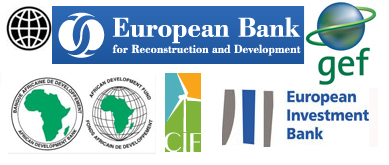During July 2014, the European Investment Bank (EIB) and the Global Environment Facility (GEF) have reported on climate investments.
Both the African Development Bank (AfDB) and European Bank for Reconstruction and Development (EBRD) announced partnerships with the Climate Investment Funds (CIF) for a variety of climate-related investments.
The World Bank also announced additional funding to be provided by CIF.
 31 July 2014: During July 2014, the European Investment Bank (EIB) and the Global Environment Facility (GEF) have reported on climate investments. Both the African Development Bank (AfDB) and European Bank for Reconstruction and Development (EBRD) announced partnerships with the Climate Investment Funds (CIF) for a variety of climate-related investments. The World Bank also announced additional funding to be provided by CIF.
31 July 2014: During July 2014, the European Investment Bank (EIB) and the Global Environment Facility (GEF) have reported on climate investments. Both the African Development Bank (AfDB) and European Bank for Reconstruction and Development (EBRD) announced partnerships with the Climate Investment Funds (CIF) for a variety of climate-related investments. The World Bank also announced additional funding to be provided by CIF.
On climate finance projects, on 1 July, EIB announced it is granting a €150 million framework loan under its Facility for Energy Sustainability and Security of Supply (ESF) to Banco Santander Chile. The loan is intended to fund climate action projects, such as mitigation through large and medium-scale renewable energy deployment. The loan will support ESF’s environmental sustainability, energy security and renewables development goals. Anticipated projects are wind, solar photovoltaic (PV), concentrated solar power (CSP), biomass and transmission lines. [EIB Press Release]
The GEF reported that a US$30,000 grant from its Small Grants Program, originally intended to address lack of adequate transportation in Ghana, resulted in the development of bamboo bicycles, which have considerable added environmental benefits. Farmers planting bamboo for the production of the bicycles reduce soil erosion and generate more oxygen (as compared to a stand of trees); their production helps halt deforestation, as the bamboo scraps are recycled and turned into cooking logs; and the production process requires much less energy and fewer emissions than that of steel bicycles. [GEF Press Release]
After the CIF held their governing body meetings and Partnership Forum at the end of June, AfDB reported that nine African countries (Benin, Ghana, Lesotho, Madagascar, Malawi, Rwanda, Sierra Leone, Uganda and Zambia) will receive up to US$300,000 each and operational support from CIF’s Scaling Up Renewable Energy in Low Income Countries Program (SREP). The CIF Committee meetings also approved US$25 million to be allocated to AfDB for a utility-scale solar PV project in Nigeria; US$119 million from the Clean Technology Fund (CTF) for AfDB to support CSP projects in Morocco; and Dedicated Private Sector Programs (DPSPs), expected to provide US$115 million toward development of geothermal and solar PV energy in African CIF countries. [AfDB Press Release]
On 15 July, EBRD reported that the CIF Trust Fund Committees and Sub-Committees endorsed a SREP investment of US$40 million for geothermal and utility-scale solar in Armenia to help the country reach 21% renewable energy generation by 2020. The Committees also supported bringing Libya into a $750 million investment that is already aiding Egypt, Jordan, Morocco and Tunisia in developing almost 1,000 megawatts (MW) of solar power capacity. [EBRD Press Release]
The World Bank announced on 25 July that its Board of Executive Directors approved a US$36 million loan and US$9.5 million donation through CIF for the second phase of its Pilot Program for Climate Resilience (PPCR II). Approximately 1.7 million Bolivians will benefit from the funds, which will support climate change adaptation in the water sector. [World Bank Press Release]
On publications, on 28 July, EIB released its 2013 Annual Report on the EU-Africa Infrastructure Trust Fund. In particular, the report highlights the Fund’s work on the Sustainable Energy for All (SE4ALL) initiative, including the ‘Global Energy Transfer Feed-in Tariff (GET FiT) East Africa Programme,’ the main objective of which is to assist East African countries in “pursuing a climate resilient low carbon development path resulting in growth, poverty reduction and climate change mitigation.” [EIB Publication Webpage] [2013 Annual Report EU-Africa Infrastructure Trust Fund]
The 26th issue of AfDB’s ‘Climate Finance Bimonthly Newsletter – May-July 2014’ came out on 11 July 2014. Among other items, the newsletter highlights the Pilot Africa Climate Technology Finance Center, the AfDB and Nordic Development Fund (NDF) €5 million partnership to fight climate change, Luxembourg’s accession as the 26th non-regional member country of the AfDB Group, and the Sixth Africa Carbon Forum, held from 2-4 July 2014, in Windhoek, Namibia. [AfDB Publication Webpage] [AfDB Climate Finance Bimonthly Newsletter]
In addition, AfDB published a document on 17 July 2014 that summarizes the AfDB – CIF investment portfolio. Titled ‘Growing Green: The AfDB and CIF for a Climate-Smart Africa,’ the document outlines the US$1.7 billion of approved investments in 15 countries and the Middle East and North Africa (MENA) region. The portfolio includes 16 renewable energy, one transport, three forest and five climate resilience projects. [AfDB Publication Webpage] [Growing Green: The AfDB and CIF for a Climate-Smart Africa]
The SDG Knowledge Hub publishes monthly climate finance updates that focus on news and reports on projects and other finance-related developments by MDBs and key climate finance-related institutions. Past Climate Finance Updates can be found under the tag: Finance Update: Climate Change. Climate finance news and developments relating to renewable energy and energy efficiency are published in monthly Sustainable Energy Finance Updates, which can be found under the tag: Finance Update: Sustainable Energy